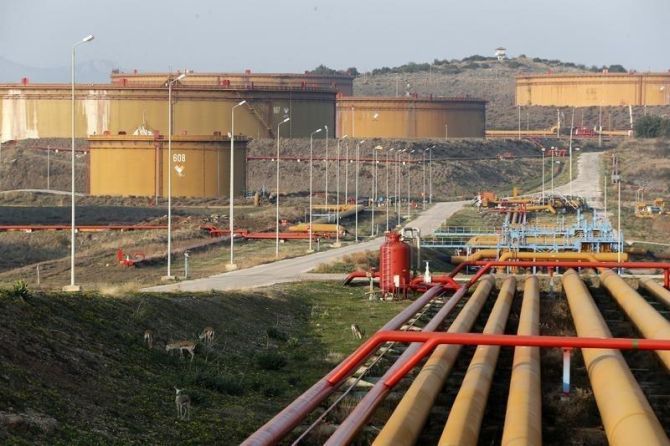 | « Back to article | Print this article |
The length of the main trunk pipeline is 1,385 km from Kakinada to Bharuch and 75 km is the length of the spur lines.

Canadian investor Brookfield-led India Infrastructure Trust (InVIT) has agreed to buy billionaire Mukesh Ambani's loss-making East-West gas pipeline for Rs 13,000 crore.
The InVIT will acquire 100 per cent equity interest in Pipeline Infrastructure Pvt Ltd, owner and operators of the pipeline that transports Reliance Industries Ltd's eastern offshore KG-D6 gas to customers, according to a statement issued by Ambani's flagship company.
After this, the existing pipeline usage agreement has been reworked to reduce capacity reserved for RIL gas to 33 million standard cubic meters per day from 56 mmscmd currently.
RIL will have to transport at least 22 mmscmd of gas through the pipeline at the revised tariff, failing which it will be liable to pay the differential amount to Pipeline Infrastructure, the statement said.
The East West pipeline originates at Kakinada in Andhra Pradesh and travels 1,460-kilometers up to Bharuch in Gujarat.
It commenced operations in 2009 with an original design capacity to transport 85 mmscmd of gas, including 21.25 mmscmd on common carrier basis.
The length of the main trunk pipeline is 1,385 km from Kakinada to Bharuch and 75 km is the length of the spur lines.
East-West pipeline operators in filings to oil regulator Petroleum and Natural Gas Regulatory Board (PNGRB) have claimed that the pipeline was built at a cost of Rs 16,347.96 crore.
The pipeline primarily transports KG-D6 gas, which has steadily dipped from 69.43 million standard cubic meters per day achieved in March 2010 to under 3 mmscmd.
RIL and its partner BP are investing $4-5 billion in developing three sets of gas fields in the flagging KG-D6 block.
The three sets of discoveries are envisaged to produce 22-25 mmscmd of gas.
Also, the pipeline is seen as a natural vehicle for transporting gas to be imported in liquefied form (LNG) on terminals planned on the east coast.
The pipeline is connected to pipelines of operators such as GAIL (India) Ltd and Gujarat State Petronet Ltd.
In the statement, the company said the amount payable for any unutilised capacity by RIL will be the difference between Rs 500 crore per quarter and the actual revenue earned by Pipeline Infrastructure.
"RIL will continue to be entitled to transport gas, either by itself or of any customers, free of cost against any outstanding unutilised capacity payments," it said.
"At the current approved final tariff of Rs 71.66 per million British thermal units, if the average volume of gas transported is 22 mmscmd, RIL will not be liable to make unutilised capacity payments," it added.
PNGRB had on March 12, approved a 37 per cent rise in tariff from April 1, for the pipeline to Rs 71.66 per million British thermal unit on a gross calorific value basis.
The next review of tariff in April 2020, will also consider upward revision to tariff arising from the determination of the lower revised capacity of the pipeline, the statement said.
"Considering the new investments in the upstream sector in the KG basin, and the growing LNG imports, ability to swap gas, the average volume expected to be transported through the pipeline is expected to be significantly higher compared to the current levels," it said.
"RIL will be entitled to significant participation in the net earnings of Pipeline Infrastructure Pvt Ltd (PIPL) under the mechanism specified in the pipeline usage agreement."
RIL's current investment in preference shares valued at Rs 4,000 crore to continue and will be converted into equity at the end of 20 years.
Further, at the end of 20 years, RIL has the right to acquire equity shares of PIPL held by the InvIT at an equity value of Rs 50 crore.
Image used for representation purpose only.
Photograph: Umit Bektas/Reuters